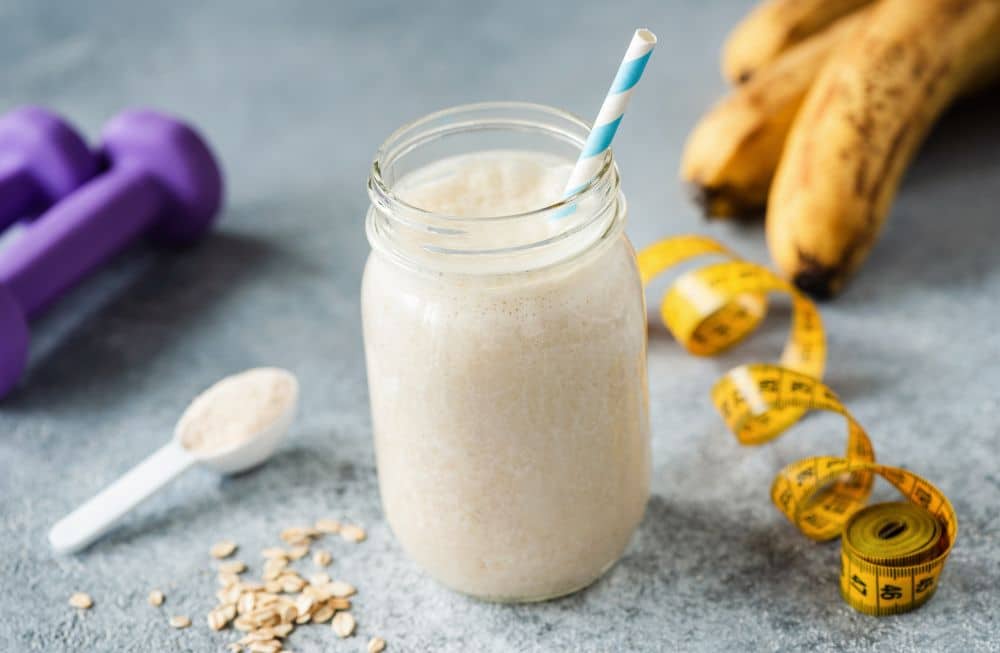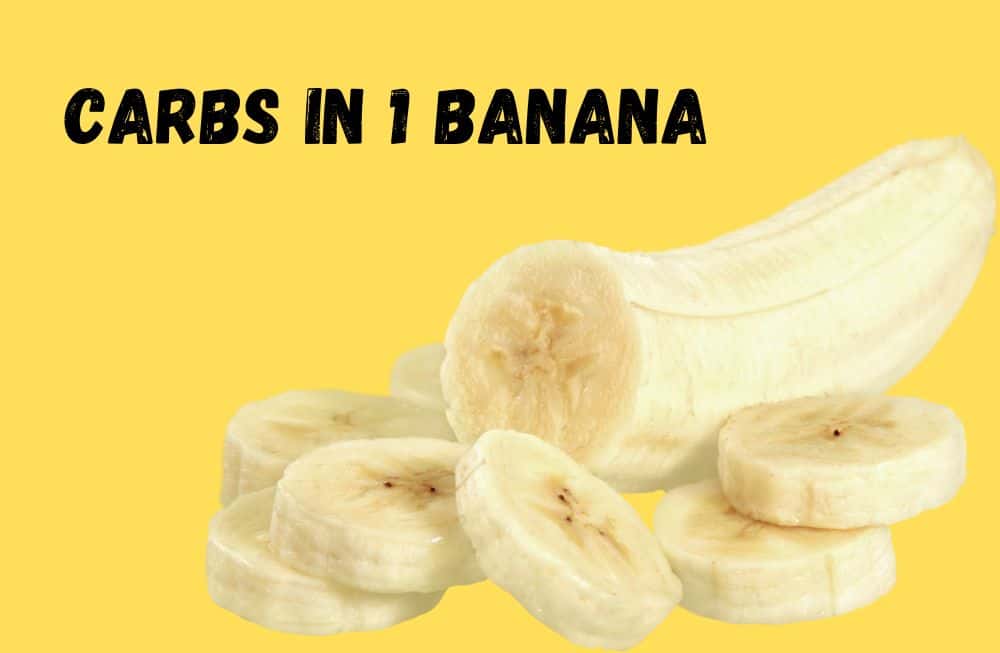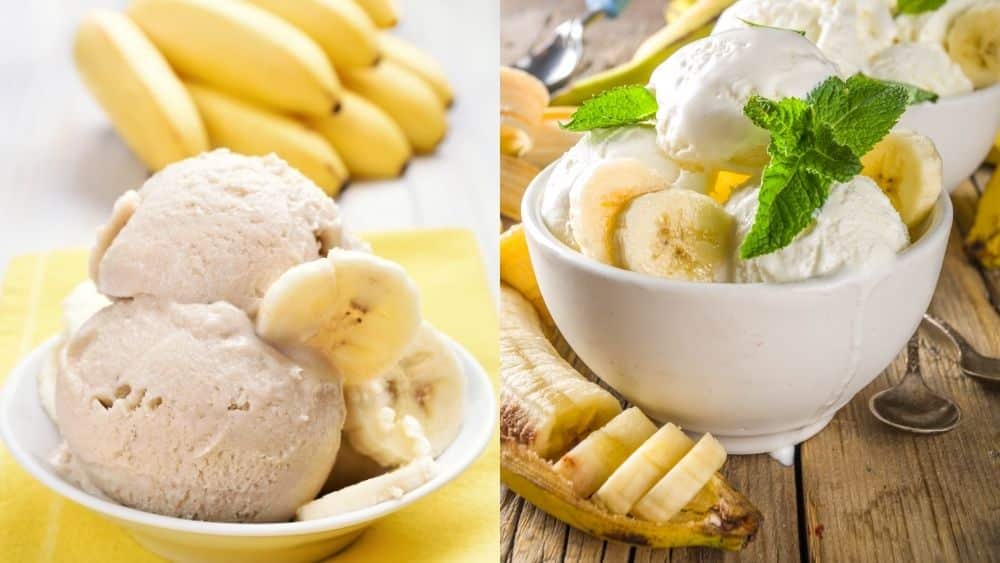Yes, bananas do have calcium, but the amount is relatively low compared to other foods. Banana is mostly known for potassium which is essential for muscle function and fluid balance. However, calcium is also important to our body which is available in bananas.
So, bananas contain calcium but what next? Maybe you also want to know more about that.
In this guide, I will also share the quantity of calcium present in bananas, juxtapose it with other food items, and find out whether bananas can aid in fulfilling our daily calcium requirements.
What Is Calcium?
Calcium is a vital mineral that significantly contributes to various functions within our bodies.
It is necessary for strong bones and teeth, muscle function, nerve transmission, and blood clotting. The body cannot produce calcium, so it must be obtained through our diet or supplements. The daily recommended intake of calcium varies based on age, gender, and life stage.
Are Bananas High in Calcium?
No, bananas are not considered a high source of calcium compared to other foods.
While they do contain some calcium, the amount is relatively small. Bananas may not be a calcium powerhouse, but they do offer other essential nutrients that contribute to overall well-being.
Common Foods High in Calcium
Here are some common foods that are high in calcium:
- Dairy products: milk, yogurt, and cheese
- Leafy green vegetables: kale, spinach, and collard greens
- Nuts and seeds: almonds and sesame seeds
- Fish: sardines and salmon
- Fortified foods: orange juice and breakfast cereals
Calcium in banana in 100g
In a 100-gram of banana, you’ll find about 5 mg of calcium, which is a pretty low amount compared to other foods rich in calcium.
Although not a heavyweight in the calcium department, bananas bring a burst of flavor and vibrant energy to your diet.
How Much Is Calcium Present in a Banana?
A medium-sized banana contains about 5-6 milligrams of calcium.
![Do Bananas Have Calcium? [Know Everything] 3 How Much Is Calcium Present in a Banana](https://phofbanana.com/wp-content/uploads/2023/12/How-Much-Is-Calcium-Present-in-a-Banana-1024x683.webp)
This relatively small amount contributes to the overall daily recommended intake of calcium for an individual. While bananas are not a significant source of calcium compared to dairy products and some leafy greens, they can still play a role in a well-balanced diet.
Given that a medium-sized banana contains only 5-6 milligrams of calcium, it is clear that bananas alone cannot meet the daily calcium requirement. However, when combined with other calcium-rich foods, they can contribute to meeting the daily calcium intake.
Some examples of other calcium-rich foods include milk, yogurts, cheese, tofu, almonds, and leafy greens like kale and spinach. Including a variety of these foods in your daily diet will help ensure that you get enough calcium to support your overall health.
Here is a table showing the approximate calcium content in different quantities of bananas:
| Bananas Quantity | Calcium Amount |
| 81 g | 4.1 mg |
| 100 g | 5 mg |
| 101 g | 5.1 mg |
| 118 g | 5.9 mg |
| 126 g | 6.3 mg |
| 136 g | 6.8 mg |
| 150 g | 7.5 mg |
| 152 g | 7.6 mg |
| 225 g | 11.3 mg |
Please note that these values may vary depending on factors such as banana size and ripeness.
Source: United States Department of Agriculture (USDA).
Does a Banana Have More Calcium Than Milk?
No, a banana does not have more calcium than milk.
According to FoodTrust, Milk boasts 125mg of calcium per 100g serving, while bananas contain only 5mg of calcium for the same amount.
This means that milk has 25 times more calcium than bananas, making it a far superior source of this essential mineral.
While milk is an excellent source of calcium, it is not the only option available to people looking to increase their calcium intake. In fact, some foods contain even more calcium than milk.
For instance, yogurt is an incredibly calcium-rich food that can contribute significantly to meeting daily calcium requirements.
A 100g serving of plain, low-fat yogurt provides approximately 150-200 mg of calcium, making it an even better source than milk.
Calcium in Banana vs Milk
To better illustrate the difference in calcium content between bananas and milk, let’s compare their calcium content in the same serving size:
| Food | Calcium Amount |
| 1 cup, mashed banana | 11.3 mg |
| 1 cup milk | 276 mg |
As you can see, milk is a significantly better source of calcium than bananas.
Do bananas have more calcium than milk?
No, bananas have less calcium than milk.
Milk is a good source of protein, potassium, B vitamins, and phosphorus. It also has a lot of calcium, which is an important mineral for bone health, muscle contractions, nerve function, and much more.
Bananas, on the other hand, are full of fiber, manganese, potassium, and vitamin B6.
Are green bananas high in calcium?
Yes, green bananas are high in calcium.
Green bananas have a higher concentration of fiber and resistant starch than their yellow counterparts. In yellow bananas, this process results in the production of sugar. Vitamins A, C, E, B6, and K can be found in abundance in green bananas.
In addition to that, they are an excellent source of fiber, iron, magnesium, copper, zinc, manganese, and folate.
Ripe and unripe are the two primary states that a banana can be in. Bananas at various stages of maturation each have their own unique set of nutrients that are beneficial to your body.
Do Ripe Bananas have Low calcium?
Yes, ripe bananas have low calcium. Bananas that are ready to eat are yellow and often have brown or black spots on their skin and do not have a lot of calcium, but they have a lot of nutrition, which help enhance the microbiome in your stomach, which in turn improves your ability to absorb calcium.
Ripe bananas have comparatively lower calcium of about 0.310 mg to 0.526 mg/kg which is shown in the upper table.
If we see what it contains and the benefits of ripe bananas;
When ripe, bananas are sweeter and taste better than when they are still green.
About 8 percent of them are starch and 91 percent are sugar.
As bananas ripen, the resistant starch in unripe bananas changes into simple sugar.
Because their glycemic index is higher than that of green bananas, yellow bananas are easy to digest.
When bananas are fully ripe, they make a chemical called Tumor Necrosis Factor, or TNF. This chemical is known to fight cancer.
Ripe bananas also have a lot of antioxidants, which have a lot of health benefits, from improving your gut health to making your skin look better.
Disadvantages of ripe banana;
Some studies show that as bananas ripen, they tend to lose some of their micronutrients.
People with Type 2 diabetes shouldn’t eat ripe bananas because they are sweeter than green bananas.
Do Unripe Bananas Have Low calcium?
No, unripe bananas are not low in calcium. Green bananas have 5 mg calcium and are an excellent source of a number of different vitamins, including vitamins B6 and C, in addition to the minerals. The human body uses vitamin B6 for a variety of biochemical functions, and it also helps speed up our metabolism.
Bananas that are not ripe are waxy and green.
Let us see the benefits and disadvantages of unripe bananas;
Benefits of consuming unripe bananas:
One of the best things about unripe bananas is that they have a high amount of resistant starch.
People with high blood sugar should eat bananas that are still green. So, if you have diabetes and like bananas, you should only eat bananas that are still green.
They have a lot of probiotic bacteria, which is important for the health of the gut and colon.
Also, green bananas absorb nutrients like calcium better, so they are always a good choice for people who care about their health.
Disadvantages of taking unripe bananas;
They have about 40% starch in them.
They are bitter and hard to break down because their glycemic index is low.
The amount of antioxidants in a fruit goes up as it ages, so unripe bananas have less antioxidants than ripe bananas.
Because they have more resistant starch, green bananas can also make you feel full and gassy.
Overall, there are good things about both kinds of bananas. If you don’t have any health problems, you should switch between the two versions to get the health benefits of each. But if you have diabetes, you should stay away from ripe bananas.
But I will suggest that if you have a problem or question, you can always talk to an expert and get the answers you need.
Is Green Banana Flour Low in calcium?
Well, the answer is exactly no. Green banana flour is rich in calcium. People who do not get enough calcium can get osteoporosis 25. So, eating a superfood like green banana flour is a great way to get the extra calcium and potassium that you require.
The flour had 2.8% soluble sugars, 70% starch, and 12.0% non-starch polysaccharides, based on its carbohydrate composition. Most of the minerals in banana flour are potassium. Fresh green bananas are a good source of vitamin C, but when they are turned into flour, almost 65% of the vitamin C is lost.
The benefits of intaking green banana flour are;
- May make the bad effects of Metabolic Syndrome less severe.
- Could lower insulin sensitivity if it helps keep the colon healthy
- Cholesterol levels might go down if it helps people lose weight.
Are Plantains Low in calcium?
Plantains are a type of banana that is less sweet and has a more starchy texture, like potatoes. They are also smaller and more dense than regular bananas.
Plantains are very high in calcium, which helps our bones get stronger and makes our muscles, teeth, and nails stronger as well.
But do you know there are also some of the benefits of plantains which are;
- They are good for digesting food.
- It makes insulin work better.
- It boosts the immune system.
- It also helps to keep the brain healthy.
- It increases the energy level and decreases cholesterol.
- Moreover it also keeps a heart healthy.
Can you have bananas on a low calcium diet?
Banana is not a good way to get calcium for your dieting as only 5 mg of calcium are in every 100g of it. Less than 1% of the DV is in a banana! But the amount of calcium in other banana products is much higher.
Besides this, a banana is also a good way to get potassium. About 16% of the DV is in it and a diet that is high in potassium can help you lose weight.
How Calcium from Bananas Helps in the Human Body
While bananas are not a high source of calcium, they still contribute to overall calcium intake. Calcium from bananas, like calcium from other sources, helps with the following:
#1. Building and maintaining strong bones and teeth:
Calcium’s star role in the body is its contribution to building and maintaining strong bones and teeth. This incredible mineral works tirelessly, day and night, to fortify the skeletal system. As we age, bone mass gradually declines, leading to a higher risk of fractures and osteoporosis. Consuming calcium-rich foods, such as bananas, helps combat this natural decline and maintain bone strength.
Moreover, calcium is essential for children’s growing bones. Providing them with calcium-rich foods, like bananas, ensures the healthy development of their skeletal structure. Beyond just bones, calcium is also essential for maintaining strong and healthy teeth. It plays a significant role in strengthening tooth enamel and promoting overall dental health.
#2. Muscle function
Flexing and relaxing your muscles might seem like a simple task, but this feat requires a delicate dance between various minerals, including calcium. Bananas serve as a tasty and handy source of calcium, and by including them in your daily food intake, you’re supplying your muscles with the essential nutrients required for peak performance.
Additionally, calcium helps regulate muscle relaxation, ensuring that your muscles don’t remain contracted after exertion. This balance between contraction and relaxation is vital for avoiding muscle cramps, spasms, and overall discomfort.
#3. Nerve transmission
The nervous system, the body’s superhighway for communication, relies on calcium to transmit vital messages between the brain and the rest of the body. Calcium ions play a critical role in the release of neurotransmitters, the chemical messengers responsible for carrying signals across nerve synapses. These neurotransmitters enable communication between nerve cells, allowing us to process sensations, thoughts, and movements.
By consuming bananas and their valuable calcium content, you support the smooth functioning of your nervous system. In turn, this helps maintain cognitive function, memory, and coordination, all of which contribute to overall mental and physical well-being.
#4. Blood clotting
While the thought of blood clotting might initially sound concerning, it is actually a crucial process that helps prevent excessive bleeding when we sustain an injury. Calcium plays a starring role in the complex process of blood coagulation. It acts as a catalyst in the clotting cascade, a series of chemical reactions that ultimately form a stable blood clot.
Ensuring you have adequate calcium levels can reduce the risk of excessive bleeding and promote faster recovery from injuries.
Additionally, bananas are a good source of other nutrients, like potassium, which helps maintain healthy blood pressure and supports heart health.
Can Bananas Help Meet Our Daily Needs for Calcium?
No, bananas alone cannot help meet our daily calcium needs.
As mentioned earlier, 100 grams of raw banana contains only about 5 mg of calcium. If you want to get the recommended daily intake of calcium, you need to eat too many bananas, which is almost impossible.
Maybe you are wondering what recommended daily intake of calcium is. It depends on age, gender, and life stage. You can get the idea from the below:
- Children (ages 4-8): 1,000 mg
- Children (ages 9-13): 1,300 mg
- Teenagers (ages 14-18): 1,300 mg
- Adults (ages 19-50): 1,000 mg
- Women (ages 51-70): 1,200 mg
- Men (ages 51-70): 1,000 mg
- Adults (ages 71 and older): 1,200 mg
Considering the low calcium content in bananas, relying solely on them for calcium intake is not sufficient to meet the daily requirements.
However, bananas can still be a part of a balanced diet that includes other calcium-rich foods.
How to Boost Calcium Absorption with Bananas
We all know that bananas are not a high source of calcium, but they do contain nutrients that can help improve calcium absorption in the body.
The potassium in bananas can help support bone health by reducing calcium excretion through urine.
To boost calcium absorption, try pairing bananas with other calcium-rich foods, such as:
- Adding sliced bananas to yogurt or a smoothie
- Combining bananas with leafy greens in a salad
- Eating a banana with a handful of almonds or other nuts and seeds
Additionally, eating bananas with foods high in calcium, such as dairy products, can improve calcium absorption.
Are Bananas a Good Source of Calcium for Vegans?
No, bananas are not a good source of calcium for vegans. Although bananas are a vegan-friendly food, they are still not a significant source of calcium. Vegans can get their daily calcium needs from fortified plant-based milk, tofu, and leafy greens, among other foods. There are lots of other plant-based calcium sources that vegans can include in their diet. Such as:
- Leafy green vegetables (kale, spinach, collard greens)
- Fortified plant-based milk (almond, soy, or oat milk)
- Tofu (made with calcium sulfate)
- Tempeh
- Almonds
- Sesame seeds
- Edamame
- Dried figs
FAQs
Can you get enough Calcium from bananas?
No, you cannot get enough calcium from bananas alone. But they do contribute to overall calcium intake; it is better to include other calcium-rich foods in your diet to meet daily requirements alongside a banana.
Is banana rich in Calcium or Potassium?
Bananas are rich in potassium but not calcium. A medium banana contains about 400 mg of potassium, which is essential for muscle function and fluid balance.
Can eating too many bananas lead to excess Calcium intake?
No, eating too many bananas is unlikely to lead to excess calcium intake. However, eating too many bananas can lead to excess potassium intake, which may cause health problems.
Do frozen or dried bananas retain their calcium content?
Yes, frozen or dried bananas retain their calcium content. Freezing or drying does not affect the calcium content of the fruit. Both frozen and dried bananas should retain their calcium content, as the freezing or drying process does not typically affect mineral content.
However, other nutrients, like vitamin C, may degrade during these processes.
Conclusion
After digging deep and conducting thorough research, the answer is a resounding yes! Bananas do contain calcium, but the amount is relatively low compared to other foods. Although bananas alone cannot meet the daily calcium requirement, they can still play a role in a well-balanced diet that includes other calcium-rich foods.
While bananas do contain some calcium, they’re not exactly the dairy alternative you’ve been searching for. In fact, a medium-sized banana only provides about 3% of your daily recommended intake of calcium.

![Do Bananas Have Calcium? [Know Everything] 2 Do Bananas Have Calcium](https://phofbanana.com/wp-content/uploads/2023/12/Do-Bananas-Have-Calcium-1024x683.webp)



![Sodium In Banana [ Nutritional Information & Health Benefits] 7 Sodium in Banana](https://phofbanana.com/wp-content/uploads/2022/07/Sodium-in-Banana.jpg)
